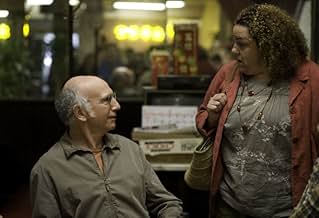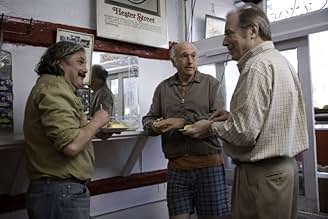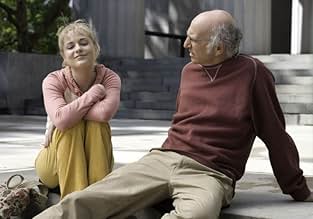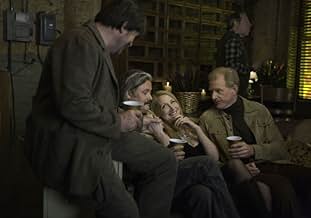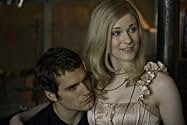AVALIAÇÃO DA IMDb
7,1/10
78 mil
SUA AVALIAÇÃO
Surpreendentemente, um divorciado de meia-idade da cidade de Nova York começa um relacionamento com uma garota muito mais jovem e menos sofisticada.Surpreendentemente, um divorciado de meia-idade da cidade de Nova York começa um relacionamento com uma garota muito mais jovem e menos sofisticada.Surpreendentemente, um divorciado de meia-idade da cidade de Nova York começa um relacionamento com uma garota muito mais jovem e menos sofisticada.
- Prêmios
- 2 vitórias e 1 indicação no total
Willa Cuthrell-Tuttleman
- Chess Girl
- (as Willa Cuthrell Tuttleman)
Avaliações em destaque
"Sometimes a cliché is finally the best way to make one's point." Boris (Larry David)
Woody Allen's witty movies may seem clichéd (love does indeed conquer all in most of his romcoms), but they do make a humanistic point couched in Allen's pessimism and nerdiness. With Larry David playing another Allen alter ego, Boris, a self-proclaimed genius, this misanthrope in Whatever Works is the best characterization of Allen in his recent movies. The movie works for me as the smartest, most enjoyable of this summer with a message countering Allen and his alter ego's world-weariness.
It doesn't take long to look at David's work co-creating Seinfeld and starring in his own Curb Your Enthusiasm to see that this world-weary worry wart is a good choice to play an Allen-like New York Jewish intellectual. Unfortunately his lack of real acting talent is a hindrance, especially when he slips into shouting many of his lines. Yet when David plays himself more than the stuttering Allen, he becomes relaxed and believable. When David speaks to the audience several times, the sincerity is powerful.
Allen wanted Zero Mostel to play this part; his death in 1977 put the script in mothballs for decades. As an accomplished Broadway and film actor, Mostel underscores David's limited acting range.
The conceit of Whatever Works is that older Boris in his 60's hooks up with twenty-year-old Southern Melodie (Evan Rachel Wood) despite his genius mind rejecting the whole affair as trite but his heart going with "whatever works." Throughout, Allen juxtaposes the Southern innocence with Northern experience creating a situation where NYC actually transforms the Southerners into urban sybarites, no better exemplified than the transformation of Melodie's mom (Patricia Clarkson) from bible thumper to artist humper with avant garde photos and multiple lovers. Even her ex-husband, John (Ed Begley, Jr.), has a NYC epiphany of the sexual kind.
Although Allen has his characters looking for love with results that will remind you of his Everyone Says I Love You, the sweetness is replaced with a philosophy that encourages searching out whatever works because of the transitory nature of love and life.
The mixture of love and cynicism allows deep appreciation of irony and the transformative nature of experience.
Woody Allen's witty movies may seem clichéd (love does indeed conquer all in most of his romcoms), but they do make a humanistic point couched in Allen's pessimism and nerdiness. With Larry David playing another Allen alter ego, Boris, a self-proclaimed genius, this misanthrope in Whatever Works is the best characterization of Allen in his recent movies. The movie works for me as the smartest, most enjoyable of this summer with a message countering Allen and his alter ego's world-weariness.
It doesn't take long to look at David's work co-creating Seinfeld and starring in his own Curb Your Enthusiasm to see that this world-weary worry wart is a good choice to play an Allen-like New York Jewish intellectual. Unfortunately his lack of real acting talent is a hindrance, especially when he slips into shouting many of his lines. Yet when David plays himself more than the stuttering Allen, he becomes relaxed and believable. When David speaks to the audience several times, the sincerity is powerful.
Allen wanted Zero Mostel to play this part; his death in 1977 put the script in mothballs for decades. As an accomplished Broadway and film actor, Mostel underscores David's limited acting range.
The conceit of Whatever Works is that older Boris in his 60's hooks up with twenty-year-old Southern Melodie (Evan Rachel Wood) despite his genius mind rejecting the whole affair as trite but his heart going with "whatever works." Throughout, Allen juxtaposes the Southern innocence with Northern experience creating a situation where NYC actually transforms the Southerners into urban sybarites, no better exemplified than the transformation of Melodie's mom (Patricia Clarkson) from bible thumper to artist humper with avant garde photos and multiple lovers. Even her ex-husband, John (Ed Begley, Jr.), has a NYC epiphany of the sexual kind.
Although Allen has his characters looking for love with results that will remind you of his Everyone Says I Love You, the sweetness is replaced with a philosophy that encourages searching out whatever works because of the transitory nature of love and life.
The mixture of love and cynicism allows deep appreciation of irony and the transformative nature of experience.
Woody Allen's alter ego, Boris (a bitterly good and sardonic Larry David) makes this statement to the audience rather early on in "Whatever Works". The truth is, no matter how misanthropic, sarcastic and neurotic Woody Allen is, he ultimately is a pretty likable personality...if you like that type. Allen's return to Manhattan after three stays in London and a wonderful stop-over in Barcelona is yet another niche film. Fans of Allen, as well as fans of Larry David's "Seinfeld" and "Curb Your Enthusiasm" (which not so ironically should be the same folks) will find plenty to laugh at here, while others will inevitability whine, "I don't care for Woody Allen...and oh, that Larry David! Can't stand him!"
The plot of "Whatever Works" is irrelevant. Boris is some sort of genius-level physicist trying to speed his way to death, though those metaphors are never explored as poignantly as they should be. It all just serves as a soap-box for Allen (through David) to funnel his usual dialogues about relationships, love, luck and the meaning of life. It's all very broad and obvious this time around, but it's sometimes nice to still be laughing at the same old feel-good shtick. It should come as no surprise that Boris also tells the audience this isn't a movie designed to make you feel good, unless you're Allen fans, and then you'll feel pretty swell afterward. Leave it to Allen to infer moviegoers are inherently morons, but we're sophisticates for watching his films.
Apparently this is a re-worked screenplay from the 1970's and the "Annie Hall" style monologues to the audience are evidence of that. In the jokes department you'll find old standards mocking the French and suggesting kids should attend "concentration camps" for the summer mixed with modern humor about the Taliban and Viagra. There's also one hilarious throw-away/blink-and-you'll-miss-it reference to James Cameron's "The Abyss" that makes you wonder if perhaps the screenplay was first reworked in the 1980's before its final incarnation here.
In the casting department we find Patricia Clarkson, yet again, is a delight in her curiously under-written over-written role (which is far too simply complex to explain in a traditional review) and continues to build a case for herself to be declared this generation's "Best Supporting Actress" twenty years from now. Evan Rachel Wood is cute-as a-button (oh, as her character might declare, what a cliché) as a Southern cutie-pie who runs away to New York City and meets up with the suicidal Boris. Allen, as always, is luminous with his photography of the "young lady." And unlike the similarly dumb motor-mouthed funny-voiced Mira Sorvino character from "Mighty Aphrodite", Wood's character is actually given an arc here and proves not to be as shallow and moronic as Boris originally assessed, which indicates maybe Allen is growing just a teeny bit in his view on women...or maybe not.
Ultimately this is yet another testament to Allen's world-view, which is summed up here as do whatever works for you to trick yourself into believing you're happy in this miserable world. Sure, there are times when Boris' diatribes run a few lines too long, or when the film stops dead when he is not on screen, but for the most part, this is Allen doing what works best for him. No other director can call himself out on all his personal pratfalls and annoying quirks yet still find a way to endear himself to the faithful who are ever patient with him and his films. No other director can be so charmingly mean-spirited and self-deprecating yet still find a way to declare his alter ego a genius at picture's end. And that's why we've always liked you, Woody, for better and for worse. For what it's worth, when it comes to Allen's better and worse, "Whatever Works" falls happily in between and works just fine, thank you very much.
The plot of "Whatever Works" is irrelevant. Boris is some sort of genius-level physicist trying to speed his way to death, though those metaphors are never explored as poignantly as they should be. It all just serves as a soap-box for Allen (through David) to funnel his usual dialogues about relationships, love, luck and the meaning of life. It's all very broad and obvious this time around, but it's sometimes nice to still be laughing at the same old feel-good shtick. It should come as no surprise that Boris also tells the audience this isn't a movie designed to make you feel good, unless you're Allen fans, and then you'll feel pretty swell afterward. Leave it to Allen to infer moviegoers are inherently morons, but we're sophisticates for watching his films.
Apparently this is a re-worked screenplay from the 1970's and the "Annie Hall" style monologues to the audience are evidence of that. In the jokes department you'll find old standards mocking the French and suggesting kids should attend "concentration camps" for the summer mixed with modern humor about the Taliban and Viagra. There's also one hilarious throw-away/blink-and-you'll-miss-it reference to James Cameron's "The Abyss" that makes you wonder if perhaps the screenplay was first reworked in the 1980's before its final incarnation here.
In the casting department we find Patricia Clarkson, yet again, is a delight in her curiously under-written over-written role (which is far too simply complex to explain in a traditional review) and continues to build a case for herself to be declared this generation's "Best Supporting Actress" twenty years from now. Evan Rachel Wood is cute-as a-button (oh, as her character might declare, what a cliché) as a Southern cutie-pie who runs away to New York City and meets up with the suicidal Boris. Allen, as always, is luminous with his photography of the "young lady." And unlike the similarly dumb motor-mouthed funny-voiced Mira Sorvino character from "Mighty Aphrodite", Wood's character is actually given an arc here and proves not to be as shallow and moronic as Boris originally assessed, which indicates maybe Allen is growing just a teeny bit in his view on women...or maybe not.
Ultimately this is yet another testament to Allen's world-view, which is summed up here as do whatever works for you to trick yourself into believing you're happy in this miserable world. Sure, there are times when Boris' diatribes run a few lines too long, or when the film stops dead when he is not on screen, but for the most part, this is Allen doing what works best for him. No other director can call himself out on all his personal pratfalls and annoying quirks yet still find a way to endear himself to the faithful who are ever patient with him and his films. No other director can be so charmingly mean-spirited and self-deprecating yet still find a way to declare his alter ego a genius at picture's end. And that's why we've always liked you, Woody, for better and for worse. For what it's worth, when it comes to Allen's better and worse, "Whatever Works" falls happily in between and works just fine, thank you very much.
In New York, the bitter and grumpy Professor of Quantum Mechanics in Columbia University Boris Yellnikoff (Larry David) is a snobbish and pretentious intellectual that claims to be a genius in String Theory and that the world is completely wrong. During an existential crisis, Boris ends his marriage with Jessica (Carolyn McCormick) and jumps through the window to commit suicide. However the canopy saves his life and Boris becomes limp and quits his job in Columbia. He moves to an old apartment downtown and gives chess classes to children to make some money. When the simpleminded religious Mississippi runaway Melodie Saint Ann Celestine (Evan Rachel Wood) asks for food to him, he temporarily lodges the girl in his apartment. Along the days, the atheist Boris shapes Melodie to his thoughts and the girl, impressed with his pretentious geniality, fits his world. Despite their difference of ages, they marry each other and have a routine life. However, the world of Boris changes when out of the blue Melodie's mother Marietta (Patricia Clarkson) arrives in their apartment.
"Whatever Works" is an ironic romantic comedy about how irrational things of the heart are. The lead character Boris Yellnikoff is annoying and maybe reflects the alter ego of Woody Allen in the present days. But the black humor is hilarious and does not disappoint the fans of this great director, with cynical and witty lines. The return of Woody Allen to New York is great and shows that he has not lost his shape. My vote is seven.
Title (Brazil): "Tudo Pode Dar Certo" ("Everything Can Work")
"Whatever Works" is an ironic romantic comedy about how irrational things of the heart are. The lead character Boris Yellnikoff is annoying and maybe reflects the alter ego of Woody Allen in the present days. But the black humor is hilarious and does not disappoint the fans of this great director, with cynical and witty lines. The return of Woody Allen to New York is great and shows that he has not lost his shape. My vote is seven.
Title (Brazil): "Tudo Pode Dar Certo" ("Everything Can Work")
Woody Allen is back to doing what he is famous for - clever introspective comedy - and he still does it well. He detoured into making crime-dramas, three of them - Matchpoint, Scoop and Cassandra's Dream. All of these were good, and one, Matchpoint, was brilliant. Then he made a pretentious drama, Vicky Cristina Barcelona, which wasn't good (but people seemed to like it just the same).
Whatever Works sees him back to comedy, and back to his beloved New York (the previous four were all set in Europe). With the setting comes the standard Woody Allen neuroses, paranoia, depression and general philosophical musings that have been a hallmark of his films. The surprise is, for once he doesn't play the neurotic, paranoid, depressed lead character. No, this time Woody Allen stays behind the camera, and Larry David, of Curb Your Enthusiasm fame, takes the part.
Larry David does a great job in the role. He was born to play the curmudgeon, and play the curmudgeon he does, to the limit. It can wear a bit thin at times, but mostly he is screamingly funny.
Supporting cast are great too. Evan Rachel Wood is convincing as the dumb innocent Southern belle, and Ed Begley jr and Patricia Clarkson are solid as her parents.
Plot is good. Maybe a bit underdeveloped - some things happen too quickly and some characters seem too flexible - and some things seem a bit trite, but it works in the end. The dialogue, however, is great. Almost as good as Allen in his heyday of the late-70s and 80s. Biting, caustic, clever.
A very funny movie.
Whatever Works sees him back to comedy, and back to his beloved New York (the previous four were all set in Europe). With the setting comes the standard Woody Allen neuroses, paranoia, depression and general philosophical musings that have been a hallmark of his films. The surprise is, for once he doesn't play the neurotic, paranoid, depressed lead character. No, this time Woody Allen stays behind the camera, and Larry David, of Curb Your Enthusiasm fame, takes the part.
Larry David does a great job in the role. He was born to play the curmudgeon, and play the curmudgeon he does, to the limit. It can wear a bit thin at times, but mostly he is screamingly funny.
Supporting cast are great too. Evan Rachel Wood is convincing as the dumb innocent Southern belle, and Ed Begley jr and Patricia Clarkson are solid as her parents.
Plot is good. Maybe a bit underdeveloped - some things happen too quickly and some characters seem too flexible - and some things seem a bit trite, but it works in the end. The dialogue, however, is great. Almost as good as Allen in his heyday of the late-70s and 80s. Biting, caustic, clever.
A very funny movie.
If ever a movie could be described as an allegorical rendition of a director's life, Whatever Works just might top the list.
Marking Woody Allen's return to his native New York City after a four picture hiatus in Europe, the movie tells the story of Boris Yellnikoff, played by Larry David (Curb Your Enthusiasm), the only actor working in Hollywood today who most closely approximates Allen himself in look, mannerisms, and philosophical outlook. Afflicted by numerous neuroses, Boris has become the ultimate pessimist, seeing life as one long water slide ride into an eventual cesspool. So bleak is his outlook that he becomes convinced that suicide is the only option, but even that cheap out fails him.
Fed up with the world, Boris turns his back on much that society has to offer, instead spending his days teaching chess to kids while publicly humiliating them at every opportunity. Yes, Boris isn't a happy camper, and takes pride in it. The fact that he's managed to maintain a core of four friends is a miracle in and of itself.
Then one day fate causes him to cross paths with Melodie St. Ann Celestine (played by the delightful Evan Rachel Wood), a country bumpkin runaway from the backwoods of Louisiana. She is Jethro Bodine to Yellnikoff's Einstein. A complete intellectual and generational opposite. Love at first sight it isn't, but given the axiom that opposites attract, Boris soon finds himself falling for the much younger siren (cue the Allen parallels).
While some critics have complained that much of the dialog comes across as stilted and unnatural (which it does), Whatever Works unravels more like a stage play than real life, which, I think, is how Allen meant it. As writer and director, he has lots to say here and refuses to allow such trivialities as natural delivery stand in the way. This isn't to say that the performances are wooden, but rather that nobody talks like Yelnikoff in real life, and I'm good with that. What's important here are the ideas, constructs and situations that Allen infuses in his characters.
Interestingly, while much of the movie's theme focuses on the serendipity of life, and thumbs its nose at the divine, the film can easily be viewed from both the atheistic and spiritual viewpoint, particularly given how events unfold in a seemingly manipulated manner.
While not Allen's finest work, Whatever Works will appeal to those who enjoy a light romantic comedy, particularly one that provokes a few sparks from our grey matter, while delivering its laughs.
Marking Woody Allen's return to his native New York City after a four picture hiatus in Europe, the movie tells the story of Boris Yellnikoff, played by Larry David (Curb Your Enthusiasm), the only actor working in Hollywood today who most closely approximates Allen himself in look, mannerisms, and philosophical outlook. Afflicted by numerous neuroses, Boris has become the ultimate pessimist, seeing life as one long water slide ride into an eventual cesspool. So bleak is his outlook that he becomes convinced that suicide is the only option, but even that cheap out fails him.
Fed up with the world, Boris turns his back on much that society has to offer, instead spending his days teaching chess to kids while publicly humiliating them at every opportunity. Yes, Boris isn't a happy camper, and takes pride in it. The fact that he's managed to maintain a core of four friends is a miracle in and of itself.
Then one day fate causes him to cross paths with Melodie St. Ann Celestine (played by the delightful Evan Rachel Wood), a country bumpkin runaway from the backwoods of Louisiana. She is Jethro Bodine to Yellnikoff's Einstein. A complete intellectual and generational opposite. Love at first sight it isn't, but given the axiom that opposites attract, Boris soon finds himself falling for the much younger siren (cue the Allen parallels).
While some critics have complained that much of the dialog comes across as stilted and unnatural (which it does), Whatever Works unravels more like a stage play than real life, which, I think, is how Allen meant it. As writer and director, he has lots to say here and refuses to allow such trivialities as natural delivery stand in the way. This isn't to say that the performances are wooden, but rather that nobody talks like Yelnikoff in real life, and I'm good with that. What's important here are the ideas, constructs and situations that Allen infuses in his characters.
Interestingly, while much of the movie's theme focuses on the serendipity of life, and thumbs its nose at the divine, the film can easily be viewed from both the atheistic and spiritual viewpoint, particularly given how events unfold in a seemingly manipulated manner.
While not Allen's finest work, Whatever Works will appeal to those who enjoy a light romantic comedy, particularly one that provokes a few sparks from our grey matter, while delivering its laughs.
Você sabia?
- CuriosidadesWoody Allen claims that he cast Larry David because David is one of the few comedians that makes him laugh.
- Erros de gravaçãoHenry Cavill plays the character Randy, a British actor. No Brit would ever be called Randy because in the UK the word randy is the equivalent of horny in US English.
- Citações
Boris Yellnikoff: That's why I can't say enough times, whatever love you can get and give, whatever happiness you can filch or provide, every temporary measure of grace, whatever works.
- ConexõesFeatured in The 81st Annual Academy Awards (2009)
- Trilhas sonorasHello I Must Be Going
From the Original Soundtrack Os Galhofeiros (1930)
Written by Bert Kalmar (as Bert Kalmer) & Harry Ruby
Performed by Groucho Marx and Cast
Courtesy of Universal Studios
Principais escolhas
Faça login para avaliar e ver a lista de recomendações personalizadas
- How long is Whatever Works?Fornecido pela Alexa
Detalhes
- Data de lançamento
- Países de origem
- Centrais de atendimento oficiais
- Idioma
- Também conhecido como
- Así pasa cuando sucede
- Locações de filme
- Empresas de produção
- Consulte mais créditos da empresa na IMDbPro
Bilheteria
- Orçamento
- US$ 15.000.000 (estimativa)
- Faturamento bruto nos EUA e Canadá
- US$ 5.306.706
- Fim de semana de estreia nos EUA e Canadá
- US$ 266.162
- 21 de jun. de 2009
- Faturamento bruto mundial
- US$ 36.020.534
- Tempo de duração1 hora 33 minutos
- Cor
- Mixagem de som
- Proporção
- 1.85 : 1
Contribua para esta página
Sugerir uma alteração ou adicionar conteúdo ausente








